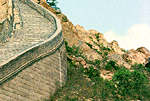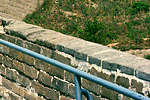 |
 |
 |
 |
 |
 |
 |
 |
 |
 |
 |
 |
 |
 |
 |
 |
|
August 28, 2001 China's ExpansionismSecretary of State Colin Powell's Asian tour was supposed to garner support from longtime allies and to patch up relations with recent rival and growing power, the People's Republic of China. |
|
But those hawks Rumsfeld and Armitage went along for the ride and while in Canberra discussing the Echelon spy system and containment policies, the US delegation voiced its desire for a loyal and gung-ho Australia to pledge the blood of Australian troops in the event of a conflict in the region. Basically: if the US has to fight the Chinese in the South China Sea or in the Taiwan Strait, Australians better be there to catch a few bullets. The demand for loyalty came in the context of a four-nation alliance including Japan, S. Korea, Australia and the US with the sole purpose – stated or unstated – of building a wall around China. When Australian officials tentatively endorsed the idea, Beijing reacted with predictable rhetoric and bluster. Australia, for its part, is proceeding with caution. There is cause to worry as China expands economic relations with Papua New Guinea and opens negotiations with the Irian Jaya independence movement. China is definitely challenging Australia's role in the region, but for Australia to jump into an alliance which threatens China might not be as productive as a facilitating role between the US and China. The specter of Chinese expansionism is used to legitimize military alliances, spy plane fiascoes, arms sales, spy technology transfers and even agricultural subsidies. A Cold War is already beginning and specters such as these can quickly turn words and sanctions into gunshots and sorties. So, how dangerous is this Chinese expansionism which demands that Australian as well as American blood be put at political disposal? TERRITORIAL INTEGRITYMost Chinese scoff at the idea of an expanding Middle Kingdom. There are enough problems and threats inside of the country that the Chinese government must collar and control – there is no benefit whatsoever in a militaristic China. Of course, Taiwan is not considered a country, and neither is Tibet. And the Spratly Islands are also Chinese territory, according to Beijing. Therefore the presence of warships and troops in the area and the disputes with Vietnam and the Philippines are actually a grand misunderstanding: this is an internal affair between China and the barnacles attached to the rocks that bestride a major oil route from the Middle East to Japan and South Korea.… Historically, tribute reached the Chinese Emperor from all eight directions: Mongolia, East Turkestan, Burma, Vietnam, Korea … for these were all under Chinese sway at one time or another. China has fought a war with Vietnam and with India over borders and even exchanged fire with the Russians in the north, but these territorial disputes are mere pebbles of concern in comparison with the "Taiwan Question." China will most likely not risk its international reputation and regional standing by outright invading and occupying part of a sovereign nation, but 1.3 billion people are ready to die for Taiwan. Taiwan can be considered a matter of territorial integrity, but Chinese influence in the Spratly Islands's, the South Pacific and the Indian Ocean refuse to be categorized in such a manner and must serve a different sort of need. FOR THE LOVE OF OILThe race for Central Asia's oil is on and the big powers are making alliances, financing guerillas and making investments in efforts to take the pot. In the Balkans, the West is busy setting up proxy states to provide for safe transit while China and Russia play friendly older brother to old enemies in the Shanghai Cooperation Organization. China has found a new buddy in Pakistan, a country in need of ring magnets and other goodies in its ongoing conflict with India. Pakistan faces heavy sanctions due to the 1998 testing of a nuclear weapon – these sanctions have placed Pakistan in the familiar Third World position of having to default on debts and invite the IMF to dismantle everything in the name of reform. China has slowly replaced the US as Pakistan's most important ally by investing in railroad projects and the Gwadar port project, and by providing loans and grants to help Pakistan stave off its debt crisis. With Sino-US relations on the rocks and a new US-India alliance taking form, Pakistan and China have found it convenient to expand relations past ammunition manufacture and military technology transfers. The Gwadar Port and railway projects are significant in that the port will be able to serve the Middle East as well East Asian and African countries while the railways will link Central Asian oil with the Indian Ocean. "Gwadar Port will serve as the hub for transshipment and oil shipments to the entire Central Asian region, offering the shortest and most economical route," said Javed Ashraf, Pakistan's Minister of Communication. China is also working with Burma to create a rail-link from Yunnan to the coast – a completed railway would provide the Chinese navy with an Indian Ocean port as well as a stronger presence in South East Asia. The US is vexed by the region's inability to control the flow of heroin and has provided support for government troops in Thailand and Cambodia to combat the drug dealers. The region will be most likely become another forum for the Sino-US Cold War.... A Chinese port on either side of India and a fortified island across a major oil route to Japan would really encroach on American Pacific expansionism, wouldn't it? |
Text-only printable version of this article Sascha Matuszak
is a teacher living and working in China. His articles have appeared
in the South China Morning Post, the Minnesota Daily,
and elsewhere. His exclusive Antiwar.com column appears Tuesdays. Archived columns Free
Markets or Supermarkets Sailing
Towards World Significance China's
Youth Revolution |
NO STRINGS ATTACHEDChina is considered by many developing countries to be their champion. If a choice had to be made between aid from a Western country or China, most developing countries, including Papua New Guinea, would choose China. China doesn't much care for a country's internal politics or economic structure. If they did, all the hot air coming out of Beijing concerning Taiwan and economic reform would be as hypocritical as it is comical. So when Beijing doles out money to an impoverished nation, demands for privatization or transparency aren't included in the package, as they are with most US or Aussie aid packages. This goes over real well with the locals. When Beijing offers gifts of cash, investment, technology and stadiums to Fiji, Papua New Guinea and Indonesia, the leaders of those countries perk up and denounce Taiwan as being harmful to the harmony and peace of the region, as Papua New Guinea Prime Minister Mekere Morauta stated this May. Gifts are an important part of life here in China. Almost anything can be accomplished in this kingdom of underpaid, lazy bureaucrats if a pack of smokes or bottle of liquor is attached to the request. To give a gift with strings attached is a serious breach of etiquette, just as socially inept as not returning the favor. Gifts work just as well between states as they do between paupers. China, even as it worries neighbors with its size and might, also woos smaller nations with a dose of Asian culture that white guys in Canberra and Washington can't seem to grasp. China's expansionism is no different from any other expansionism encountered throughout history, save for the quest for territory. Although China has more people than it can handle and not enough resources for sustained industrialization, it has no legitimate claim to land outside of its current borders, with the exception of Taiwan. The only possible victims of the PLA are Taiwanese and dissidents. The first Cold War was a battle of expanding militaries framed in ideological terms while the new Cold War is a battle of expanding economies framed in military terms. China is depicted as a threat to our lives. Australian's must be willing to spill their blood in defense of democracy. New bases, alliances and weapons must be shipped to the Pacific to deter the Yellow Threat. When, actually, the threat is not to anybody's life but to their livelihoods. Farmers, textile workers and Dick Cheney the oil tycoon all face pressure from Chinese economic expansionism. But according to the marvelous capitalist virtues the USA is supposedly founded on, the stronger more efficient economy with the best price and best quality wins – that's the way it should be and has to be for capitalism to work, say the sages. But we all know that the invisible hand is weak and pitiful if the iron fist isn't behind it. Chinese expansionism is capitalist expansionism replete with fortifications, government handouts and gifts and political maneuvering.… What really threatens the US is not the military threat of an emergent China, but the notion that Chinese can play the capitalist game as well if not better than Americans. Please Support Antiwar.comSend contributions to Antiwar.com or
Contribute Via our Secure Server |
|
